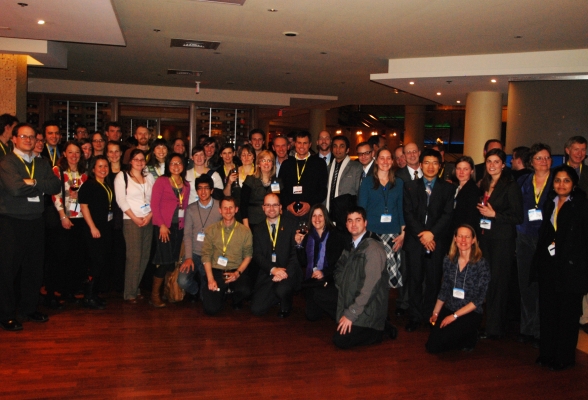TRB, In Case You Missed It

If you weren’t one of the 10,000 people who attended the Transportation Research Board’s Annual Meeting in January, there are fifty students and twenty faculty for PSU, UO, OSU and OIT who can tell you what they learned there. OTREC's bright yellow lanyards made our presence especially visible! PSU student Brian Davis blogged about his experience, OTREC’s Jon Makler was interviewed in a local newspaper, and the Oregon “delegation” at the conference was covered by both local and national blogs. Team OTREC filed some daily debriefs, highlighting presentations on topics such as federal stimulus investments in Los Angeles and Vermont’s efforts to address their transportation workforce crisis with returning military veterans (as well as the snow storm that affected the conference’s last day).
For first-time attendees, the Transportation Research Board (TRB) can be an overwhelming experience. In his blog entry, Davis described: learning how to navigate the conference’s three hotels; discovering the value of attending committee meetings (rather than poster or lecture sessions); dressing to east coast "standards"; and networking, networking, networking.
Another TRB rookie from Oregon was Metro’s Deena Platman, who helped organize a post-TRB debrief at PSU for TransPort, a committee she leads that helps coordinate regional efforts related to intelligent transportation systems (ITS) and transportation system management and operations (TSMO). Like Davis, Platman found that committee meetings were very valuable, especially for networking. She noted that the meetings were a great opportunity to learn about the leading edge of research and practice and who is involved in critical innovations.
Platman noted that the speaker who most impressed her was Robert Paddon of TransLink (Vancouver, BC) who describe how his agency used traveler information tools to manage mobility during the 2010 winter Olympics. She said that her daily work will be most influenced by what she learned about how social media can be used, especially in relation to Metro’s “Smart Mobility Hub” efforts. On the fun side, she said experiencing DC's Bike Share was a real highlight.
On Wednesday, February 9th, Platman held TransPort’s monthly meeting in PSU’s Intelligent Transportation Systems lab so that students and faculty could join the regular participants, many of whom are ITS engineers and planners from local agencies and consulting firms. PSU students Alex Bigazzi, Brian Davis and Shirisha Kothuri each shared their experiences at the conference, as did PSU faculty Kristin Tufte), OTREC’s Hau Hagedorn, TriMet’s Dave Crout and the City of Portland’s Peter Koonce.
Data was a major theme at the debrief. Tufte noted the growing emphasis on the cost effectiveness of data collection and storage. Bigazzi shared that best practices in the modeling of transportation emissions emphasize empirical rather than modeled emissions, which carries significant data requirements. Koonce related data to USDOT’s Connected Vehicle Initiative, which has the potential to generate vast amounts of data than could be used to improve how transportation infrastructure is managed and operated. Speaking for Trimet (where Transit Signal Priority already represents a form of Connected Vehicles and open source data is the norm), Crout described hearing a speaker who discussed how transit map design can influence route choice and travel behavior. Platman shared being struck by the nexus of social media and transportation, such as traveler information that commuters could receive directly from transit vehicles.
One TRB highlight that is special for OTREC was a session hosted by Peter Appel, Administrator of USDOT’s Research and Innovative Technology Administration, and Rob Bertini, OTREC’s founding director and Deputy Administrator of RITA. The session, "A Senior Level Dialogue with Transportation Students" was an opportunity for future transportation professionals to ask questions and communicate in a more personal environment. Appel had the idea for this session during his visit to Oregon in November 2010 and several OTREC students had the opportunity to attend. For PSU’s Brian Davis, the session impressed upon him the importance of developing communication skills and tools for his future in the transportation profession.
